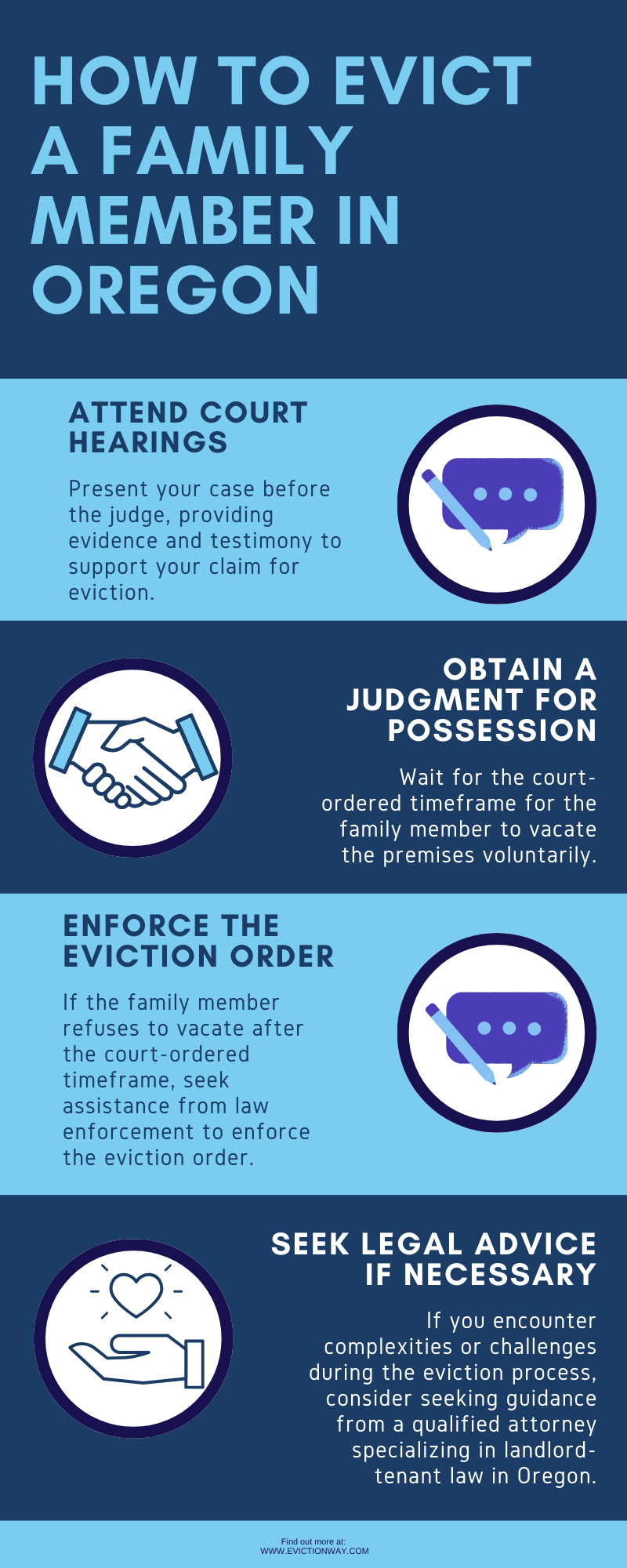Are you facing the difficult situation of needing to evict a family member from your Oregon home? This can be a complex and emotional process, but it’s important to know your rights and the legal steps involved. In this blog post, we’ll guide you through the process of evicting a family member in Oregon, providing practical advice and legal tips to help you navigate this challenging time.
To evict a family member in Oregon, you’ll need to follow a specific legal process. This typically involves providing written notice to the family member, filing a formal eviction complaint with the court, and attending a court hearing. We’ll walk you through each step in detail, explaining the forms you need to complete and the timelines you must adhere to.

We understand that evicting a family member can be emotionally taxing. That’s why we’ll also provide tips on how to approach the situation with sensitivity and respect. We’ll discuss ways to communicate your decision clearly, offer support during the transition, and protect your own well-being throughout the process.
How To Evict a Family Member In Oregon
Evicting a family member can be a difficult and emotional process. However, it is important to remember that you have the right to protect your property and your rights as a landlord. If you are considering evicting a family member, it is important to follow the proper legal procedures.
1. Give Notice
The first step in evicting a family member is to give them proper notice. In Oregon, you must give your tenant at least 30 days’ written notice before you can evict them. The notice must state the reason for the eviction and the date by which the tenant must vacate the property.
2. File a Complaint
If your tenant does not vacate the property after you have given them notice, you will need to file a complaint with the court. The complaint should state the reason for the eviction and the facts that support your claim.

3. Serve the Complaint
Once you have filed a complaint, you will need to serve it on your tenant. You can do this by having a process server deliver the complaint to your tenant in person.
4. Attend the Hearing
After you have served the complaint, the court will schedule a hearing. At the hearing, you will have the opportunity to present your case to the judge. Your tenant will also have the opportunity to present their case.
5. Obtain a Judgment
If the judge rules in your favor, you will be granted a judgment of eviction. This judgment will give you the legal authority to evict your tenant from the property.
6. Enforce the Judgment
Once you have obtained a judgment of eviction, you can enforce it by having the sheriff evict your tenant from the property. The sheriff will physically remove your tenant from the property and change the locks.
How Much Does it Cost to Evict a Family Member in Oregon?
The cost of evicting a family member in Oregon can vary depending on several factors, including the county in which you live, the complexity of the case, and whether you hire an attorney.
In general, you can expect to pay between $300 and $1,000 in court costs and filing fees. If you hire an attorney, you can expect to pay an additional $1,000 to $3,000.
| Expense Category | Estimated Cost Range | Notes |
|---|---|---|
| Filing Fee | $88 – $300 | Fees vary by county and case type |
| Service Fee | $30 – $100 | Cost for serving the eviction notice |
| Attorney Fees | $500 – $7,000+ | Highly variable; complex cases cost more |
| Court Costs | Varies | Miscellaneous fees, if the case goes to trial |
| Locksmith | $75 – $250 | If changing locks is necessary |
| Storage Costs | Varies | Costs for storing evicted person’s belongings |
- In some cases, you may be able to get a fee waiver if you meet certain income requirements.
- If you are evicting a family member who is a minor, you will need to file a dependency petition with the court.
- This process can be more complex and time-consuming than a standard eviction, and it may require the assistance of an attorney.

FAQs: Evicting a Family Member in Oregon
Here are some of the most asked questions.
What are the grounds for evicting a family member in Oregon?
In Oregon, you can evict a family member if they have violated the terms of their tenancy, such as by not paying rent or damaging the property. You can also evict a family member if they are engaging in illegal activities, such as drug use or violence.
How do I start the eviction process?
To start the eviction process, you must give your family member a written notice to vacate the property. The notice must state the reason for the eviction and the date by which your family member must leave. You can find a sample notice to vacate on the website of the Oregon Judicial Department.
What if my family member refuses to leave?
If your family member refuses to leave after you have given them a notice to vacate, you can file an eviction lawsuit with the court. The court will then hold a hearing to determine whether or not your family member should be evicted. If the court rules in your favor, you will be issued a writ of possession, which will allow you to have your family member removed from the property by law enforcement.

Can I evict a family member who is a minor?
Yes, you can evict a family member who is a minor. However, the process is more complicated than evicting an adult. You will need to file a petition with the court and prove that the minor has violated the terms of their tenancy or is engaging in illegal activities.
What are some resources that can help me with the eviction process?
There are a number of resources available to help you with the eviction process, including:
- The Oregon Law Center: 1-800-654-5912
- The Oregon State Bar: 1-800-452-7636
- The Oregon Housing and Community Services Department: 1-800-927-7368
Related:
